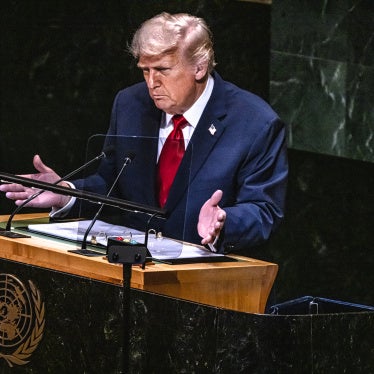Human Rights Watch writes to Secretary Rice urging the appointment of a special envoy for the UN Human Rights Council (HRC) to address the challenges and opportunities that the council will face during its critical formative years.
Dear Madam Secretary:
We write to you today to urge that you appoint a special envoy for the UN Human Rights Council (HRC) to address the challenges and opportunities that the council will face during these critical formative years.
The United States government has repeatedly affirmed its commitment to building a strong and effective Human Rights Council, despite its decision not to seek council membership. In light of the US government’s recent announcement that it will again not seek a seat on the council, the appointment of a special envoy is essential to signal that strengthening the HRC remains a US government priority. Moreover, we believe that creation of a special envoy position is critical to pursuing the US government’s objectives at the HRC, and that the HRC must be an essential element of the United States’ strategy to promote human rights worldwide.
The US government already has a strong team of dedicated professionals working on the HRC in both Washington and Geneva. We do not believe, however, that the staffing dedicated to the HRC has kept pace with the demands associated with the development of a new human rights institution that meets throughout the year. We are convinced that a special envoy could not only help address that gap but also raise US advocacy on the HRC to a new level.
We share your concern that the council has not yet dedicated sufficient attention to grave human rights situations around the world. We believe though that this is a key moment to reconsider and amplify US engagement, and that there are a number of achievable objectives if the US government were to make such a commitment. One of the shortcomings of work on the HRC so far has been a noticeable gap between activities in Geneva and capitals. While the membership of the council is far from ideal, there is a workable majority of countries that could be expected to take positions supportive of human rights. However, due to regional group allegiances, the untimely deterioration of the situation in the Middle East, and effective manipulation of North/South tensions by human rights opponents, this majority has not been an effective force within the HRC. The United States has the ability to help change this dynamic by using a special envoy to help build a stronger coalition of human rights supporters in the HRC.
Furthermore, the General Assembly will elect 14 new HRC members to three-year terms in early May. Again, it appears that human rights supporters may be outflanked by those seeking to weaken human rights protections. States with poor human rights records, including Belarus, Venezuela and Egypt, have indicated their intention to run, while it remains unclear which more-human-rights-friendly states will contend. Both the Asian and African groups have signaled their intention to put forward “clean slates” of candidates (to propose a number of candidates equal to the number of seats available for their regions). Such a step would mean that those posts are not subject to a true election, and would be a substantial step backward from last year’s HRC campaign. A US special envoy could work in Geneva, New York, and capitals to discourage violators from running, promote candidates with a genuine commitment to human rights, and urge all regions to avoid clean slates.
In addition to the election of new members this spring, the council’s implementation of new mechanisms and its treatment of situations of concern will put in place a framework for the council’s activities in coming years. It is essential that the US government take all possible steps to ensure that a proper foundation for the HRC’s future work is laid.
While the Human Rights Council is imperfect, it is the premier international forum for the protection of human rights and fundamental freedoms. No viable alternative exists. A US decision to appoint a special envoy to the council would send an unequivocal signal to allies as well as detractors that the United States is committed to strengthening human rights protection worldwide, and that it is unwilling to allow the council to be dominated by those who fear exposure of their own abysmal human rights records. Other states that are committed to strengthening human rights protections may be persuaded to follow suit.
We urge you to act immediately to appoint a full-time, year-round special envoy for the Human Rights Council with the responsibility to attend all Human Rights Council sessions and travel to capitals and New York between sessions to advance the United States’ human rights priorities and interests.
Sincerely,
Kenneth Roth
Executive Director





